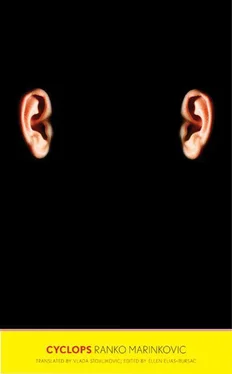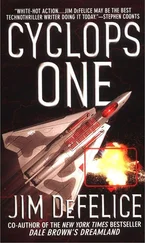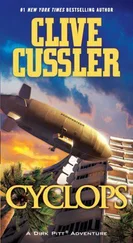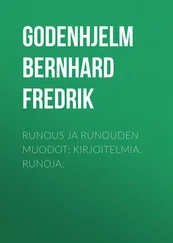“Oh, you give credit then?” Melkior joked to hide his feeling of shock. The invalid did not like the joke and let it pass with a sigh:
“Ahh, he’s to be pitied, believe me.”
“Pitied indeed,” Melkior echoed in all sincerity, but presently hastened to undo it, “and yet conceivably he can retrieve his kilos, while you can’t get your leg back. Your loss is greater than his.”
“But he’s going to die!” the invalid cried didactically.
“Meaning you won’t? Haven’t you in fact been at death’s door, weren’t you dying in Galicia when the Russian Emperor’s brotherly shell kissed your leg? And later on, in the field hospital in Káposvár or somewhere, bedbugs eating you as punishment, as if you’d invented war! ‘Wasting away,’ indeed! Come off it, man!”
Without bothering to collect his ticket, Melkior hurried over to the corner where Dom Kuzma was standing on the blind man’s weighing machine, leveling the arms himself, seeking a balance for them. His fingers were trembling in the prayer wherein he supplicated God to stretch forth his arms and show His mercy by way of the arms of the scale. And, lo and behold, God lent him a hand, Dom Kuzma stepped down, elated, and began hurriedly emptying his pockets, as if preparing to rob himself. He piled his keys, wallet, watch, coin purse, breviary, and handkerchief and other odds and ends on the small bench next to the scale. He even took off his hat — and stepped back up. The inspired machine mercifully overlooked the fact that the client had divested himself of a thousand grams and showed his previous weight with a smile. In vain did the priest and the blind man shake and whack it (Dom Kuzma actually struck it) — it stood firmly by its statement, suffering for the truth.
Dom Kuzma took offense at the act of consolation. What was the point of sprucing up reality so stupidly? “Damn you,” he said and decided to weigh himself once again, with all his possessions back in place.
The scale now gave a joyous leap of a full one thousand two hundred grams and stood steadfastly by its assertion. It bore all the torture unleashed upon it by its frightened rider, stubbornly repeating what it had said before. The martyr. Its beaklike weights were seeking each other with the yearning of amorous birds, to come together in an everlasting kiss of equilibrium, harmony, and peace.
“At last!” Dom Kuzma sighed with relief and gave his blessing to the innocent kiss. “See?” he said to the blind man. “Obviously it got it wrong the first time. It’s not without reason that I keep telling you to have it fixed. Oh well, third time’s a charm, as they say …” He paid the blind man twice as much as usual, but warned him before leaving, “Anyway, you’d do well to have it checked. You’ll lose your customers, my friend!” and away he went, his faith shaken in all the scales in the world.
“How interesting,” thought Melkior, himself feeling a weakened confidence in the invalid’s machine. Dom Kuzma’s mistrust was weighing on him; God only knew how many tricks of the trade those people had up their sleeves. … Nevertheless he stepped onto the blind man’s machine.
“Oh Eustachius the Long Lost! Oh Ineffable Eustachius!” called out a clarion voice behind his back. Melkior broke out in goose bumps: he had a sudden feeling of standing stark naked on the scale watched by all the passersby. He pretended the cries had nothing to do with him: he went on talking with the blind man.
“Defies the imagination, gentlemen, defies the imagination!” The man with the clarion voice was laughing an ugly laugh, baring front teeth pocked with large dark fillings. “An intellectual, a Schweik, speculating on the weighing machine. Look at him! Take a good look, all you sharp-eyed people! The military speculator! Heh, heh, heh … Going to the blind man! Good-looking people!”
Passersby stopped and watched with interest. Somebody asked his neighbor: What did he steal? You were here when it started, weren’t you?
No one knew anything about the curious incident, nor was anyone able to make sense of it. Was there going to be a brawl?
The drunkard had come right up to Melkior and was touching his ears, his chin, displaying him to the audience as if he were a carnival barker showing off a freak dwarf, a two-headed pig, a shark that had devoured a Swedish tourist …
The blind man extended both hands to fend off the drunkard, but the other pressed a two-dinar coin into each: “Not a lot, but it’s the gesture that counts,” and patted them.
The audience was now expecting an amusing spectacle: the man was totally drunk. … Having got his first laughs, the drunkard went on with his makeshift show.
“So, dear bard,” he addressed the blind man, “how heavily does the fear of war weigh upon the mind of this Eustachius the Peaceable?”
“What’s this nonsense? You’re mad!” Melkior whispered in his ear.
“How about you, Monsieur Boulechite?” the drunkard addressed a short stout man who was grinning with glee and stroking his ear with pleasure. “What do you think of my madness?”
“Listen, you …!” the short fatty took offense. “Watch it or I’ll box your ears in, you …!”
“Oh, that I will, you … Stroking your ear, I see? Is that ear your breadwinner by any chance, working in the capacity of eldest son for May I See Your ID Card Ltd? If so, please treat it paternally; such an ear is worth more than seven plump cows. Also, by all means protect it from contact with heavy fists wearing bulky rings.”
Fatty had not been able to pull the right strand out from that tangle of words: he was thrown off by “ID card” and “heavy hands.” He plunged sensibly in among the overcoats and umbrellas, muttering unlikely threats.
The drunkard meanwhile leapt onto the platform of the weighing machine, waved his hat and shouted: “Drive on, izvoshchik!” He had one arm around Melkior’s neck, waving with the other and clucking his tongue: driving horses … and, closing his eyes, enraptured, he began reciting Yesenin:
… a troika is dashing across the field
but I’m not on it — someone else is instead …
My joy and my happiness, where have you fled? …
and tears welled in his eyes. He kept repeating “My joy and my happiness, where have you fled?” as tears streamed down his cheeks.
The onlookers watched as he wildly drove the troika on the weighing machine, tears flowing from his eyes, and someone whispered respectfully, “He’s crying.” And he, perhaps having heard the whisper of sympathy with his grief, suddenly jumped off the machine and bared his dark fillings in a grin.
“Eustachius Equivalentovich, I haven’t got a kopeck to my name, you pay the izvoshchik,” he said to Melkior. “Citizen Ferdyshchenko, I think it’s time to shut up shop,” and on the overcoat button of a curious passerby who had just stopped to see what was going on he surreptitiously hung a CLOSED sign he had kept tucked under his overcoat, having apparently lifted it from a shop door. The curious citizen had no idea anything was hanging down his belly and was laughing with the others. Meanwhile Melkior was still standing on the scale sweating in dismay. He’ll slink away as soon as Ferdyshchenko spots the sign, and then Ferdyshchenko will take it out on me …
“Tell me, Ugo,” he said pleasantly, “where might I find you later on?”
“Ugo, quoth he! Have you forgot my Giventakian moniker?”
“Parampion, I mean. Where will you be later this evening?” Melkior corrected himself patiently.
“Now you’re talking! At Hotel Pimodan, dear Eustachius, of course, at Hotel Pimodan … or, in our parlance, at the Give’nTake. Everybody will be there. They are looking for you. … Maestro the Mad Bug has been asking after you for months. Over and over he asks: where’s our sagacious Eustachius? Don Fernando will be there, too, for a change. Do come.”
Читать дальше












